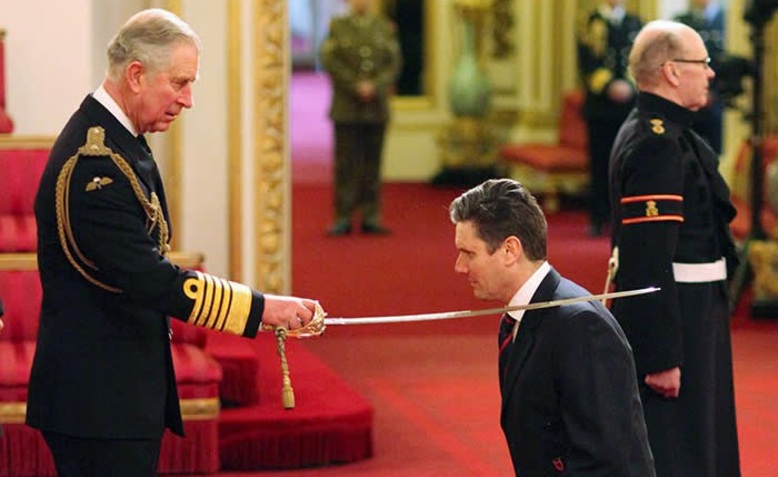 Keir Starmer receives his knighthood. Photo: D Anthony Thompson via Twitter
Keir Starmer receives his knighthood. Photo: D Anthony Thompson via Twitter
The Corbyn project is well and truly over as Keir Starmer’s Shadow Cabinet announcements herald a deeply troubling rightward turn, argues Tom Lock Griffiths
Sir Keir Starmer’s victory as leader of the Labour Party was predictable, but despite his hostile stance towards Jeremy Corbyn and his active engagement in the ‘People’s Vote’ campaign, many still held out hope that his appointment as leader of the opposition wouldn’t necessarily mean the Corbyn Project was dead.
He did after all talk consistently left during his leadership election campaign, saying in the Camden New Journal (his constituency local paper) on March 17th
I am a socialist. For me, what I’m driven by in this is the very deep inequalities that we’ve now got across the country of every sort: Income, wealth, health, influence, it’s deeply ingrained. I believe that in order to change that you’ve got to do fundamental change, and shift power and wealth and I think that we need to do things more radically than we had envisaged in the past. For me, it’s a very practical application.
With the appointment of his new Shadow Cabinet, it’s clear that Keir will steer the Labour Party rightwards to a more centrist position, pushing the two main parties in British politics ever closer together and making a mockery of the idea that the Labour Party any longer offers the genuine alternative that so many had hope for during the leadership of actual socialist Jeremy Corbyn.
While we saw it coming, it still hurts.
A closer look at his appointments reveals that Labour is now very much a party of the status quo.
Troublingly the new Shadow Chancellor of the Exchequer Anneliese Dodds, when asked who her role model is, she cited the leadership of Gordon Brown during the financial crisis.
She told BBC Radio 4’s Today programme: “I was very engaged in politics at the time when Gordon Brown led that international response to the financial crisis that occurred back in 2008-9 and I was inspired by his international leadership back then.”
Lisa Nandy the new Shadow Foreign Secretary, has always been hostile to Corbynism and quit the frontbench in 2016 during the Labour Party ‘chicken-coup’ and then went on to back Corbyn’s only rival Owen Smith in the ensuing Labour Leadership contest.
In 2019 she said, she resigned from Jeremy Corbyn’s shadow cabinet because allies of the Labour leader wanted opponents within the party to be ‘smashed’.
She also criticised the party’s election manifesto, saying a major pledge to offer free broadband for every home and business had ‘missed the mark for people who are struggling with so many other things in their daily lives at the moment’.
Jonathan Ashworth remains Shadow Secretary of State for Health and Social Care.
During the 2019 General Election, a tape was leaked in which Ashworth was heard saying Labour would not win the election and suggesting the civil service would have to “safeguard security” if Jeremy Corbyn entered No 10.
While Ashworth has remained a positive voice on safeguarding the NHS, he has a worrying voting record, having for the replacement of Trident with a new nuclear weapons system and for mass surveillance powers.
David Lammy is now Shadow Justice Secretary and has a long record of opposing Corbyn and socialist ideas, as recently as March 6th 2020, he told a journalist in a chummy interview in the Financial Times, ‘The British aren’t interested in revolution’ and described himself self-confessed ‘Remainiac’.
Lammy was especially scathing of the Corbyn leadership over antisemitism, on LBC he attacked his own Party, openly saying, ‘What happens to a political party when members of the NEC are putting around the most vile antisemitic tropes about Mossad agents in the party, about being controlled by Israel? I’ve heard these tropes for all of my life, it’s ugly and of course you should be expelled from the Labour Party.’
Lammy also played a central role in the ‘People’s Vote’ campaign which played a decisive and devastating role in the 2019 election for Corbyn’s Labour Party, outside the 2018 Labour Party Conference during a ‘People’s Vote’ rally in an openly hostile rant he said, ‘can you hear us Jeremy Corbyn!?’.
Establishment grandee, Lord Falconer now Shadow Attorney General is a close ally of Tony Blair and lived with him for a time in the 1970s and served in the cabinet under him from 2003 to 2007. And so on and so on.
Undoubtedly, the politics of the reformulated Labour Party is that of the status quo, what Tariq Ali rightly calls the ‘Extreme Centre’.
Sadly, the Corbyn Project is finally over.
But that doesn’t mean it was all for nothing, the last 5 years since the monster demonstration held by the People’s Assembly in London in June 2015 calling for an end to austerity, and the platform from which Jeremy Corbyn announced his intention to stand as Labour Leader, has seen an unprecedented renaissance in socialist ideas.
Now more than ever, those socialist ideas must continue to inform all our activity and encourage us to rebuild our movement. It is very clear that these ideas are now, in the middle of the Covid-19 crisis, not just a matter of parliamentary politics and industrial struggle but will have to necessarily permeate our daily lives as we try to adapt to our new reality.
And when the time is right, socialist ideas will take to the streets once more where the struggle for a genuine alternative will be best placed to reassert itself into British politics, it just won’t have much support from Sir Keir Starmer’s new centre party.

